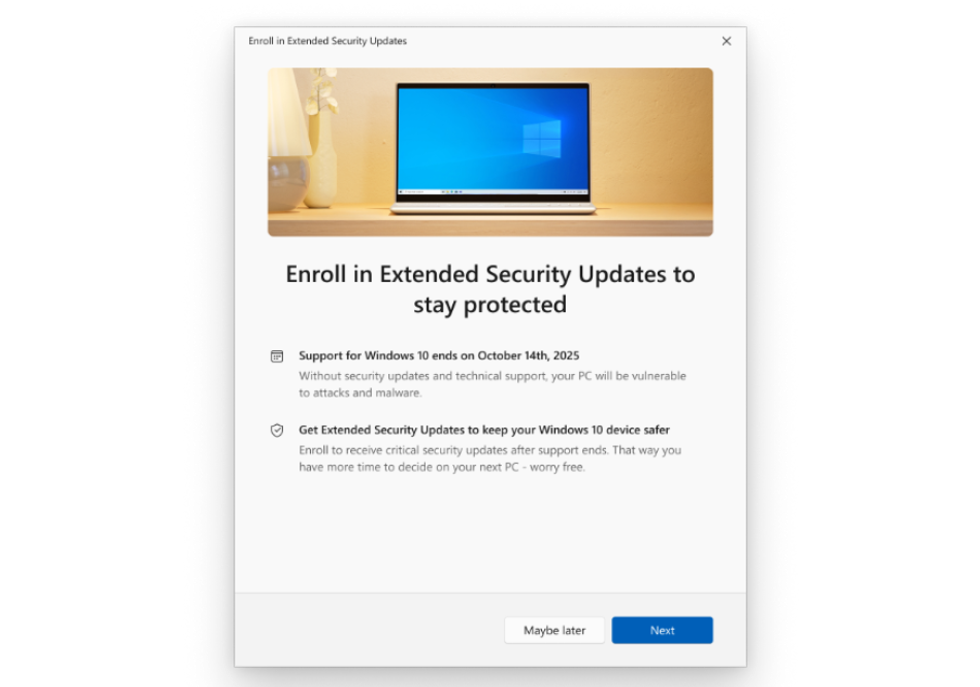



If you're reading this on a Windows 10 laptop or desktop PC — you've got before your device becomes a sitting duck for cybercriminals. Microsoft from October 14, 2025.
While , millions of people still rely on Windows 10 on their laptops and desktop PCs every day. Microsoft has warned that Windows 10 users who continue to rely on the software .
The really terrifying bit?
plan to keep using their PCs after the deadline passes, according to new research from Which? That equates to millions typing passwords, checking bank accounts, and storing precious family photos on machines that hackers can exploit without fear of Microsoft fixing the vulnerabilities.

Extended Security Updates (ESU) offer a way to unlock an additional one year of vital patches for Windows 10 users
|MICROSOFT PRESS OFFICE
The latest survey from Which? found that while 39% of existing Windows 10 users would update their operating system, a troubling 26% of those surveyed said they would keep using the operating system without support.
Discussing the results, Which? Tech magazine editor, Lisa Barber said: "Millions of people may be unprepared for the phasing out of Windows 10 next week. If you have a home laptop or PC running Windows, now is the time to check which version you’re using and if it’s Windows 10 or older, make a plan of action.
"If you don’t act, you could become more vulnerable to hackers and scams."
According to Which?, of those who are not planning to take action following the Windows 10 deadline this month are aged 55 and over.
@gbnews An important change is coming for Microsoft Windows users. Here's how to protect your security. #technology #microsoft #gbnews
What can you do to protect yourself? Here's a rough overview of the options open to you:
The only alternative is to sit and do nothing, putting your data at risk.
This isn't simply a problem for the UK. Industry estimates suggest hundreds of millions of computers worldwide still run Windows 10, with nearly 43% of all Windows PCs dependent on the soon-to-be-defunct operating system. Microsoft Executive Vice President Yusuf Mehdi isn't mincing his words.
Writing in , he stated: "Microsoft will no longer provide security and feature updates and technical support for Windows 10 PCs. While these devices will continue to function, they will no longer receive regular security updates, making them more vulnerable to cyber threats, such as malware and viruses."
And it's not just the increased threat of malware and other vulnerabilities. He added: "Applications running on Windows 10 may no longer be supported, as the platform is no longer receiving feature updates. As a result, some apps may experience decreased functionality."
If you’re using Windows 10 today, checking if your PC can upgrade to Windows 11 is simple. Just click the button, then go to .
This should be the simplest way for millions of PC owners to avoid losing critical security patches and updates, but there's a catch.
Microsoft requires that your PC meet specific hardware requirements, including 4GB of RAM, 64GB of storage, and additional security measures, like a Trusted Platform Module (TPM) version 2.0, which many older PCs released at the beginning of the Windows 10 era lack.
If you want to continue using Windows 10 safely, Microsoft's Extended Security Updates (ESU) cost £24 for one year of protection ending October 2026. You can dodge that fee by either redeeming 1,000 Microsoft Rewards in your account (if you have them) or enabling Windows Backup.
That last option might sound free, but it's got a catch – Windows Backup uses OneDrive, and you only get 5GB of free storage. Once you go over that limit, you're looking at expensive monthly subscription fees.
Can't upgrade? Google's , while the "End of 10" project helps users switch to Linux. Both keep older machines secure without Windows 11's strict requirements. Third-party firm .
